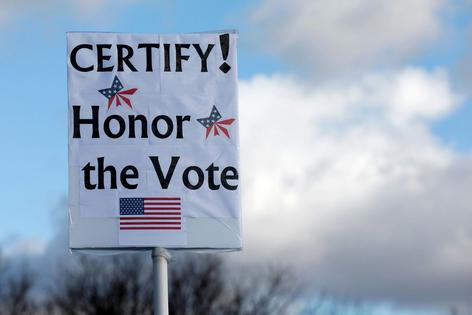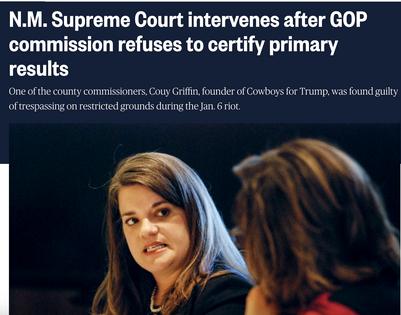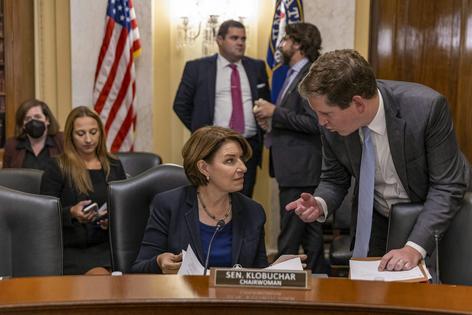No, local election officials can’t block certification of results – there are plenty of legal safeguards
Published in Political News
Some local election officials have refused to certify election results in the past few years. Georgia has new administrative rules that invite election officials to investigate results before certifying. And worries abound that election officials might subvert the results of the 2024 presidential election by refusing to certify the results.
While states may have different names or processes, certifying an election typically looks something like this: On election night, the local precincts close, and local election workers tabulate the vote; they affirm or attest that the precinct results are the proper tabulation and send those results to the county.
In a matter of days, the county election board assembles the results across all the county’s precincts, tabulates them and certifies the county’s result. Those results are sent to the state election board, which adds up the results from all the counties and certifies the state’s winners. The governor then signs certificates of elections for the winning candidates.
There isn’t one weird trick to steal a presidential election. And there are ample safeguards to ensure ballots are tabulated accurately and election results are certified in a timely manner.
Certifying an election is a rather mundane task. In law, it is often called a “ministerial” obligation, which means it does not involve individual discretion. It is little more than making sure all precincts have reported and the arithmetic is correct. But it is an important task, because it is the formal process that determines who won the most votes.
Election officials typically carry out this obligation with little fanfare. But in recent years, some election officials have questioned the election results. Some officials have wondered whether the voting machines that tabulate votes were functioning correctly, or they wanted to investigate other aspects of the election. At the certification stage, however, election officials do not have that power.
If there are major questions about the election, the power to investigate them lies elsewhere. Other election officials verify absentee ballot signatures or calibrate ballot tabulation machines well before the election, a task typically open to public viewing.
A losing candidate might file an election contest in court to challenge the results of the election, and a court can take evidence and hear the legal dispute. Certification, in contrast, is a simple and ministerial task.
If an election official or board refuses to certify an election, that refusal does not last long. After some refusals in recent years, election officials learned of the legal consequences for failing to perform their obligations, including being removed from office and facing criminal prosecution. Most officials quickly relented and ended up certifying. And none of the delays in certification ever lasted long enough to miss deadlines set by state law for certification.
If election officials still refuse to do their job, they can be sued in court. The secretary of state might sue to ensure officials complete the tasks required for election administration. Or a winning candidate might sue to ensure that he or she receives a certification of election.
In 2022, for instance, after an election board refused to certify the results in Otero County, New Mexico, the secretary of state filed a lawsuit in the New Mexico Supreme Court. In just one day, the court ordered the board to certify the election. The board did.
But these elections were not presidential elections, and the stakes are high as 2024’s election approaches. What if election officials refuse to certify results – and, worse still, defy courts that order them to certify results?
The law is prepared for that, too.
If a party refuses to comply with a court order, the court can order someone else to perform it, and it is given the same legal effect. A court can quickly and easily ensure election results are certified in a timely fashion.
For those worrying about the 2024 presidential election, there are even more safeguards. Congress enacted the Electoral Count Reform Act of 2022. The act clarifies the rules surrounding the certifying of results in presidential elections and the counting of electoral votes in Congress.
For instance, the act requires state officials to finish the certification of election results by “the second Wednesday of December,” which is Dec. 11 this year. Courts can ensure that election officials who may be dragging their feet will comply with this federally mandated deadline.
Read more:
And if officials miss that deadline, the act anticipates that a court may be asked to step in. The act instructs Congress to give full effect to any certification of election results issued by a court, even if it’s after the Dec. 11 deadline.
In short, the legal system is built to handle election officials who delay certification or refuse to certify results. No single election official or group of them can stymie an election.
Of course, the refusal to certify an election can still have consequences. It can sow confusion and discord among the public. It can undermine people’s faith in elections and call into question the results when there are no reasonable grounds to dispute the outcome.
Those political and practical concerns are serious, and it is important for the public and election officials to act in good faith and to respect the legal process as it plays out.
But such rhetoric will not prevent the election of a winning candidate.
This article is republished from The Conversation, a nonprofit, independent news organization bringing you facts and trustworthy analysis to help you make sense of our complex world. It was written by: Derek T. Muller, University of Notre Dame
Read more:
2020’s ‘fake elector’ schemes will be harder to try in 2024 – but not impossible
Congress passes legislation that will close off presidential election mischief and help avoid another Jan. 6
Jan. 6 hearings highlight problems with certification of presidential elections and potential ways to fix them
Derek T. Muller does not work for, consult, own shares in or receive funding from any company or organization that would benefit from this article, and has disclosed no relevant affiliations beyond their academic appointment.




























































Comments